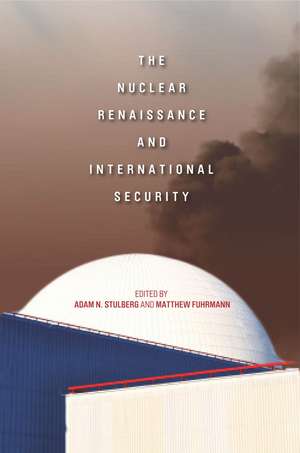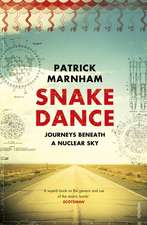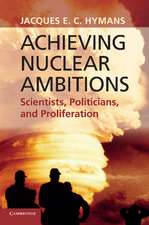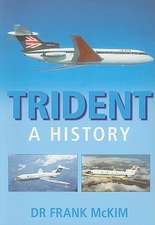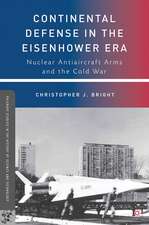The Nuclear Renaissance and International Security
Editat de Adam Stulberg, Matthew Fuhrmannen Limba Engleză Hardback – 22 ian 2013
Interest in nuclear energy has surged in recent years, yet there are risks that accompany the global diffusion of nuclear power—especially the possibility that the spread of nuclear energy will facilitate nuclear weapons proliferation. In this book, leading experts analyze the tradeoffs associated with nuclear energy and put the nuclear renaissance in historical context, evaluating both the causes and the strategic effects of nuclear energy development.
They probe critical issues relating to the nuclear renaissance, including if and how peaceful nuclear programs contribute to nuclear weapons proliferation, whether the diffusion of nuclear technologies lead to an increase in the trafficking of nuclear materials, and under what circumstances the diffusion of nuclear technologies and latent nuclear weapons capabilities can influence international stability and conflict. The book will help scholars and policymakers understand why countries are pursuing nuclear energy and evaluate whether this is a trend we should welcome or fear.
They probe critical issues relating to the nuclear renaissance, including if and how peaceful nuclear programs contribute to nuclear weapons proliferation, whether the diffusion of nuclear technologies lead to an increase in the trafficking of nuclear materials, and under what circumstances the diffusion of nuclear technologies and latent nuclear weapons capabilities can influence international stability and conflict. The book will help scholars and policymakers understand why countries are pursuing nuclear energy and evaluate whether this is a trend we should welcome or fear.
Preț: 451.13 lei
Preț vechi: 556.95 lei
-19% Nou
Puncte Express: 677
Preț estimativ în valută:
86.32€ • 94.06$ • 72.74£
86.32€ • 94.06$ • 72.74£
Carte tipărită la comandă
Livrare economică 23 aprilie-07 mai
Preluare comenzi: 021 569.72.76
Specificații
ISBN-13: 9780804784177
ISBN-10: 0804784175
Pagini: 376
Dimensiuni: 152 x 229 x 25 mm
Greutate: 0.61 kg
Editura: Stanford University Press
Colecția Stanford Security Studies
ISBN-10: 0804784175
Pagini: 376
Dimensiuni: 152 x 229 x 25 mm
Greutate: 0.61 kg
Editura: Stanford University Press
Colecția Stanford Security Studies
Recenzii
"[A] well-documented series of essays by 14 well-qualified analysts. . . . Although all of the chapters are worthy of attention, those providing statistical analysis may be of particular interest in that they call into question some of the traditional assumptions of analysts regarding the prospective impact of an expansion of nuclear power generation. . . . Recommended."—C. W. Herrick, Choice
"Adam Stulberg, Matthew Fuhrmann and their co-authors offer a sober assessment of the key drivers and consequences of the spread of nuclear energy just when the industry and nonproliferation community need it most. Their skillful blending of cutting-edge research with practical commentary will enhance efforts to meet the challenges posed by global civil nuclear expansion in the years ahead."—Former Senator Sam Nunn, Co-Chairman, Nuclear Threat Initiative
"Fuhrmann and Stulberg's well-structured volume provides a broad and deep understanding of the causes and consequences of the "nuclear renaissance." This insightful volume asks all of the big questions raised by the future of nuclear power and brings together leading experts to shed light on them. The carefully researched chapters avoid overly simple answers, instead providing analysis that supports nuanced conclusions. Beyond advancing the scholarly debate, this excellent volume offers valuable guidance to policy makers."—Charles Glaser, The George Washington University
Notă biografică
Adam Stulberg is Associate Professor in the Sam Nunn School of International Affairs at Georgia Tech. Matthew Fuhrmann is Assistant Professor of Political Science at Texas A&M University.
Descriere
The Nuclear Renaissance and International Security examines the causes and strategic effects of global nuclear energy development.
